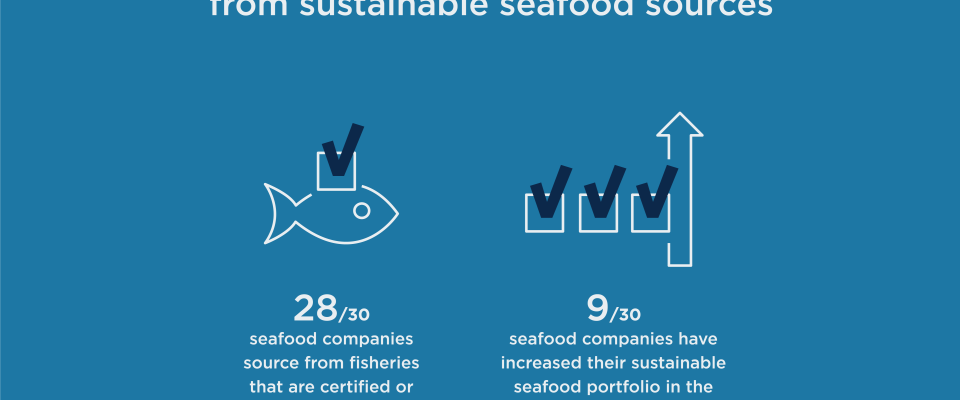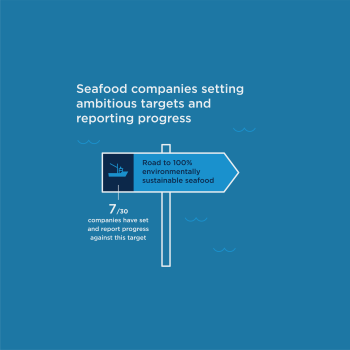Key finding
Companies must better demonstrate efforts to support sustainable seafood

The 30 companies assessed in the Seafood Stewardship Index collectively represent approximately a quarter of the global seafood industry’s revenue, wielding considerable influence over industry practices. Guaranteeing that these organizations use sustainable sources of seafood is vital to ensure the health of our oceans. Systems that independently verify seafood operations as sustainable (e.g., ratings and certification) and support credible improvements (e.g., aquaculture and fishery improvement projects) are key tools for companies to showcase their commitment to addressing and mitigating environmental impacts, such as overfishing and bycatch.
Most companies use certification, ratings and improvement projects to drive and demonstrate sustainability in their operations and supply chain
Certifications and ratings are useful tools for companies to demonstrate the environmental sustainability of their seafood products. Our results show that 28 [BL1] out of 30 companies assessed report sourcing at least a portion of their portfolio from certified operations. This underscores industry-wide recognition of the importance of aligning with certifications to demonstrate sustainable and environmentally responsible practices. Additionally, 14 out of 30 companies report actively sourcing from fisheries in the process of attaining certification, showcasing a collective effort towards expanding sustainability initiatives. However, in many cases additional transparency and disclosure is required, as it is often unclear how much of the portfolio comes from sustainable sources. For example, some companies report that their products meet their sourcing criteria – which includes several criteria including certified, improving, green or yellow rated and/or legal – but don’t provide a breakdown of what percentage applies to each, despite the fact that each of these represents a very different level of sustainability.
Although some progress can be observed, overall, the steps the industry is taking towards achieving greater sustainability are not always translating into an increase in the sustainability of their portfolio. Only 9 out of 30 companies provide concrete evidence showing an increase in the percentage of their portfolio that is independently verified as sustainable since 2021. Moreover, only 12 out of 30 companies demonstrate that at least half of their wild catch portfolio is certified through a recognized and credible certification scheme. This underscores the industry’s ongoing challenge in ensuring a significant portion of their operations adheres to rigorous sustainability standards.
Companies demonstrating leadership
There are a few companies that showcase leading practices in this area. Trident Seafoods, for instance, has made progress in its reporting practices, showing how its portfolio is aligned with robust sustainability standards since 2021. The company asserts that 99% of its products are harvested from fisheries certified by Global Sustainable Seafood Initiative (GSSI) benchmarked schemes, including MSC and ASC certifications. Similarly, Cargill is transparent about its sustainability commitments, disclosing that 43% of its marine ingredients hold certification from the MSC, while 80% have earned certification from MarinTrust. Nomad Foods stands out as another noteworthy example, with 98% of its fish and seafood volume certified by the MSC.
Moreover, many companies are actively engaged in fishery improvement projects, addressing challenges prevalent in the seafood industry. Thai Union, for instance has only reported 2.4% of MSC certified sites but 85% of its sites involved in fishery improvement plans in 2021. These initiatives underscore the industry’s collective efforts to enhance sustainability and address challenges through systematic improvements.
Maruha Nichiro demonstrates leading practices in the reporting of the sustainability status of its wild-caught seafood portfolio. The company conducted a sustainability assessment and shares a breakdown by species, certification status, FIP status or unassessed.
